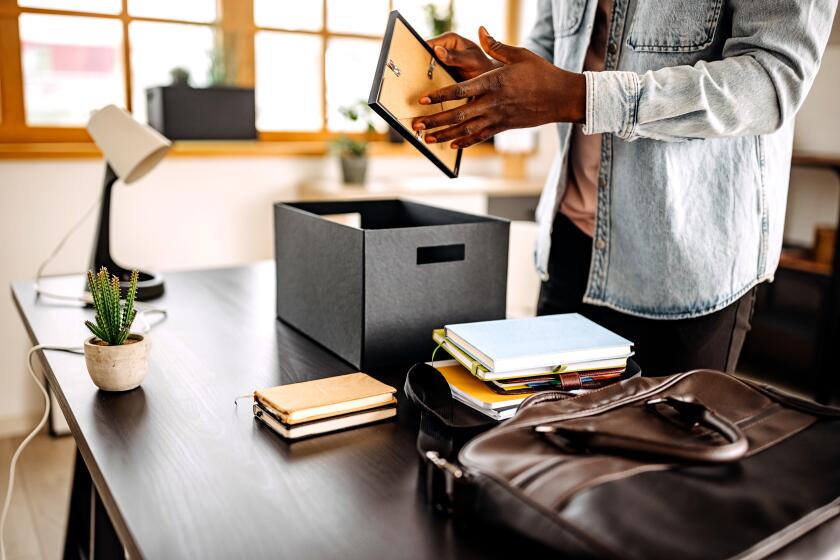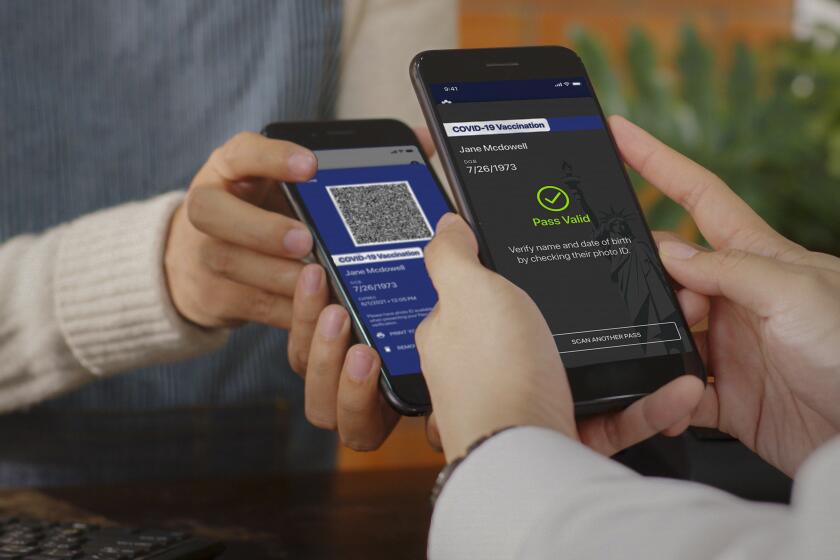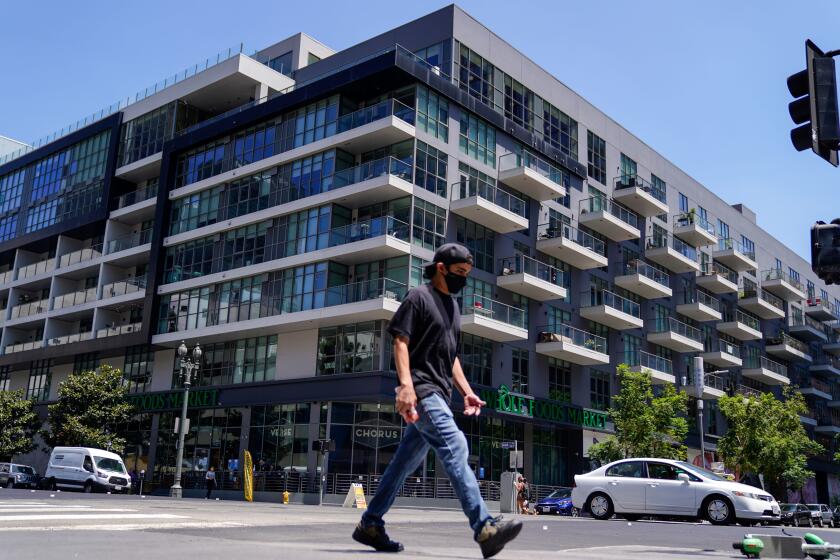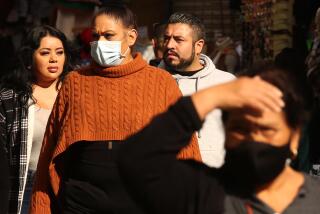What workers want from customers: Don’t be a jerk, say if you’re vaccinated, and please keep masking
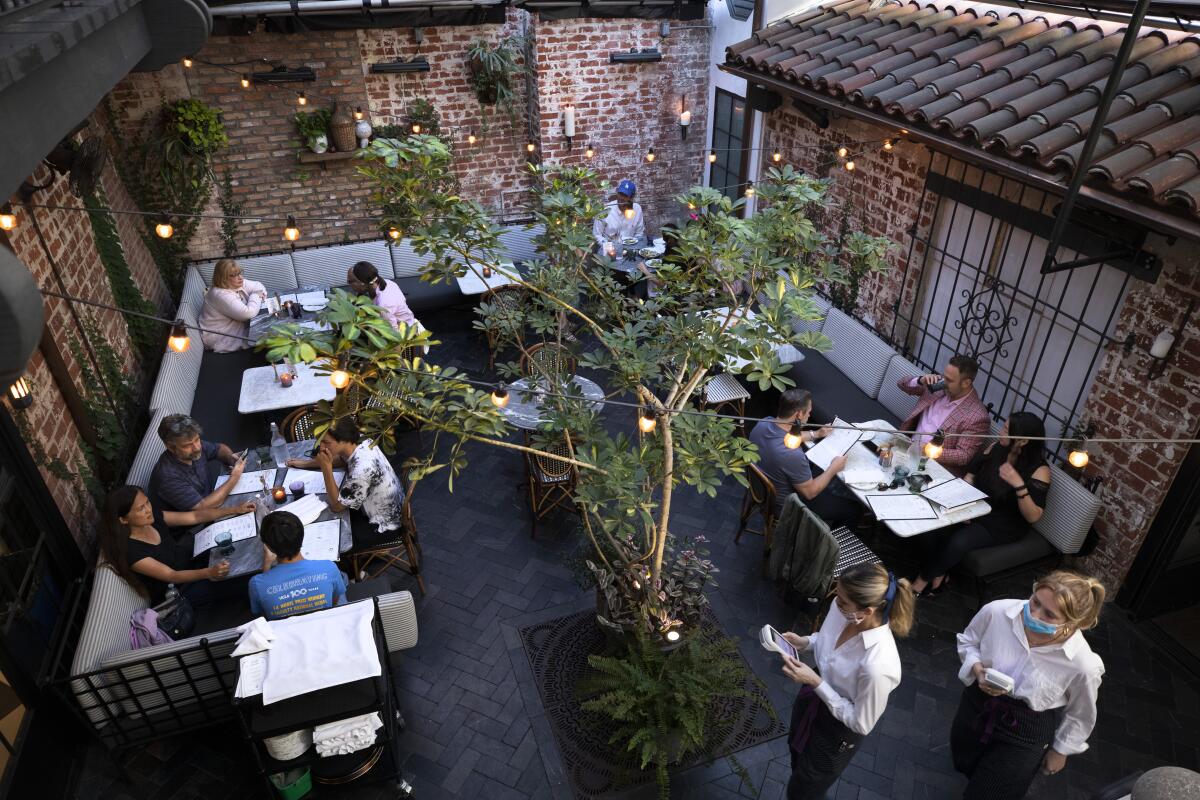
- Share via
Front-line workers have gone through the wringer during the COVID-19 pandemic. Their customer-facing jobs meant they could not escape potential exposure to the coronavirus, and the burden of enforcing safety rules largely fell on them. Hailed as heroes, some got extra pay, but many did not, and a lot of them — especially in the restaurant, hotel and travel industries — lost work.
Now we’re in another time of transition: California has eased its pandemic safety rules, and at stores, restaurants and other venues, a lot of customers feel things should be back to normal. But should they really? The Times talked to front-line workers and operators of customer-facing businesses. Here’s what they want you to know.
Keep a mask on when you can
Even if you’re fully vaccinated, continuing to cover your face can put others at ease.
“If you’re not eating, if you’re just hanging out and chatting with somebody, it would be nice to have people put their masks back on,” said Ricky Hernandez, owner of Coffee Coffee, which has locations on Melrose Avenue and Fairfax Avenue. “It’s almost like second nature anyway; we’ve been doing it for quite some time, so we don’t think it’s asking too much.”
Some pandemic-wrought changes to the business world seem lasting. (Work from home? Yes, thank you.) Others not so much. Here’s our guide to the new normal.
If you’re not fully vaccinated, continuing to wear a mask is even more important.
Rosalina Duran, a housekeeper at the Doubletree by Hilton Hotel Ontario Airport, said she’s nervous about the easing of the pandemic protocols and fears that people who have not been vaccinated won’t continue to cover their faces.
“It’s going to be difficult with the rules going away because we don’t know who is coming and who is going,” she said in Spanish.
Respect each establishment’s rules
Some businesses have pandemic precautions that are more stringent than the government requires.
Tohm Ifergan, 31, owner of Dayglow, said his coffee shops in Silver Lake and West Hollywood will continue to require customers to wear masks when they enter, order and are not seated.
But he is bracing for pushback. In recent months, “we’ve witnessed many people enter unmasked, screaming at our faces, spitting at us, throwing chairs, blasting us on social media, calling us ‘libtard’ and ‘unpatriotic,’” said Ifergan, who also works as a barista at the shops. “Everything that you think — it’s happened.”
Pent-up demand, pandemic savings, back-to-office mandates -- experts say it will all add up to a historic wave of people leaving their jobs.
Before Tuesday, “it was nice to fall back on the health department’s mandate” in enforcing the rules, he said. “Now that it’s not a requirement from a county standpoint, are we going to get even more aggression from those types of people? ... There’s a subtle fear that if we want to continue to do things that make us feel more comfortable, it’s only going to cause more challenging interactions.”
Phil, a safety compliance worker at an entertainment company, said he wished customers would understand that safety protocols at a place of business come from the company, not from rank-and-file workers.
“It’s not up to us,” said Phil, who asked to be identified by only his first name because he feared repercussions from his employer. “Even though we’re enforcing the rules, we don’t make the rules.”
Cut back on chitchat
Even workers with outgoing personalities now have reason to back away from small talk.
Pamela Hill, a cashier at an Albertsons supermarket in South Los Angeles, said she tries to limit her contact with customers because she wants to minimize her chances of catching the coronavirus and bringing it home to infect her family.
“I try to restrain from any type of conversation with [customers] because we know that the [virus] is airborne. So I try not to engage with any type of conversation with them whatsoever. I just want to get them in and get them out.”
Although new infections have dropped in California, the pandemic isn’t over. And at the store, “we’re still in a confined space,” Hill said.
If you’re fully vaccinated, feel free to say so
Kathryn Lundeen, owner of Culver City gift shop Lundeen’s, she said she wishes customers would be willing to tell her and her employees if they are vaccinated.
“It would make everyone more comfortable,” she said. “I have to trust that people are going to wear their mask if they’re not vaccinated, but I don’t know if that’s really going to happen.”
A person is considered fully vaccinated two weeks after receiving their second dose of the Pfizer-BioNTech or Moderna vaccines or their only dose of the Johnson & Johnson vaccine.
The federal government isn’t willing to make a digital pass or app that attests to a person’s vaccination status. Several companies are trying to fill the void.
Remember that workers have gone through a lot
Wil Thuston, who works in retail operations at Disneyland, feels bittersweet as restrictions are lifted.
“I’ve been cussed out and spat on for asking customers to wear masks, so it’s a relief to not police them anymore. But now there’s no way to know whether or not they’re vaccinated.” And he doesn’t expect everyone to stay six feet apart forever, but he’d at least like people to remain more spatially aware.
As a result of the anxiety and frustrations brought on by dealing with angry customers, he’s looking into job opportunities that would let him work remotely. “The desperation level for me to get out of my job now has amplified to where I submit an application multiple times a day,” he said. “I spend every single break and lunch at work job hunting.”
Darcey May, the general manager of Things From Another World, a comic store at Universal CityWalk, said that after seeing so many customers aggressively flout pandemic rules in recent weeks, it might be hard now for her to trust that barefaced customers are fully vaccinated.
What would May like to see from customers? “Just a little more concern for employees and their safety.”
With California’s economy reopening, rent in Los Angeles and other big cities is beginning to rise.
Showing kindness and patience helps you too
“When you’re nice, everyone wants to do their job even better,” said Armen Martirosyan, manager of family-owned Glendale restaurant Mini Kabob. “You think I want to tend to someone who’s going to be an a— to me, my mom and my dad? No. Be cool. We’re trying our best.”
“Good vibes bring on good vibes,” Martirosyan added. “We all need it, we all need that energy after this year, so we can move forward collectively.”
More to Read
Inside the business of entertainment
The Wide Shot brings you news, analysis and insights on everything from streaming wars to production — and what it all means for the future.
You may occasionally receive promotional content from the Los Angeles Times.

